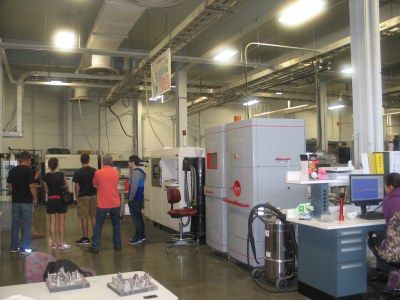University of Louisville Invests in 3D Printing
In the past few years, the explosive popularity of 3D print technology has brought about the need for a new discipline to be added to the study of 3D printing: Learning how to use 3D printers in a safe and productive manner.
Training to Use 3D Printers
There is a misconception among those who do not know a great deal about 3D printers that all you have to do is press a button, and the machine will do all the work in building the product. The truth is, the maker has to be actively involved in the part building process from the start to finish, and several problems can crop up in the middle of a manufacturing session which the maker must know how to deal with.

The University of Louisville (UoFL) recognized the need to train manufacturing students in the use of additive manufacturing machines, just as you would train someone who has to use a CNC machine about its proper handling and safety precautions.
To that end, on Feb 16, 2016 the University of Louisville partnered with UL, which is a global safety science organization, to open the UL Additive Manufacturing Competency Center. The center provides training to additive manufacturing professionals on campus to provide the manufacturing industry with a trained and knowledgeable workforce in the additive manufacturing field.
The program offers a comprehensive training curriculum which includes classes on design setup, corrections, parts production, post-processing, and inspection. Special stress is laid on establishing safety systems while using the printer by identifying possible hazards that could be created by the machines and materials.
Need for Special Training
The entire process of additive manufacturing needs to be taught to students in order to train them in the correct methods of creating 3D printed parts. The courses include teaching safety standards set by OSHA, teaching how to handle the wet separator with care at all times, proper machine set-up, and more. Additionally, special care is given to thinking about the environmental impact of chemicals that are used. The coursework has been designed to keep in mind the current industry trends in the 3D metal printing landscape and the changes that are going to take place within it in the next few years.
We have already begun to see the advantages of UoFl’s focus on incorporating 3D printing into its educational curriculum. Recently, UoFL’s Rapid Prototyping Center used their expertise in 3D manufacturing to create a model of a 14-year-old patient’s heart for only $600. The 3D model allowed surgeons to better understand the state of the child’s heart and prepare more effectively for the surgical operation. The end result of the collaboration between the hospital and UoFL was a successful heart operation, which the surgeon in charge of the operation declared was made far easier to plan thanks to being able to use the 3D model as a reference.
Innovative Research
UoFl’s focus is not just on creating trained 3D machine operators, but also on carrying out research on 3D print technology to refine and improve the process of additive manufacturing. To that end, a collaborative project known as the FirstBuild Micro-Factory, was unveiled at UoFL on July 24, 2014, in participation with various manufacturing companies.
The 35,000 square foot facility focusses on designing and building various home appliances using an online community of co-creators who use micro-manufacturing to test and customize 3D printed products in small batches. These are eventually sold off to an enthusiastic customer base. FirstBuild provides a way to create highly specialized products at reduced rates, and many believe this model of manufacturing can one day become the best manufacturing method and bring jobs back to America.
It remains to be seen how quickly that dream becomes a reality. But through their efforts, the University of Louisville has already proven that it is at the forefront of the 3D print revolution and will continue to lead the way towards more efficient and safer 3D printing practices.
Image credit Veritas Forum

